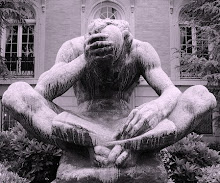 Unfortunately, I heard about this book via the movie. I haven't seen it, but that is how I became aware of its presence. I figured that I liked Borges and Marquez, so why not stereotype and see if I'd like Saramago, too. I know that Borges and Marquez are very different writers--as far as content and style--but there is a strong magic realism element in both. Though Borges' work is more Anglo-Saxon in its prose, the fantastic stories are told with such a matter-of-fact tone and mixed so seamlessly into "reality" that it does remind me of magic realism (I'm thinking specifically of his short stories like "The Gospel According to St. Mark," "The Library of Babel," and "The Circular Ruins").
Unfortunately, I heard about this book via the movie. I haven't seen it, but that is how I became aware of its presence. I figured that I liked Borges and Marquez, so why not stereotype and see if I'd like Saramago, too. I know that Borges and Marquez are very different writers--as far as content and style--but there is a strong magic realism element in both. Though Borges' work is more Anglo-Saxon in its prose, the fantastic stories are told with such a matter-of-fact tone and mixed so seamlessly into "reality" that it does remind me of magic realism (I'm thinking specifically of his short stories like "The Gospel According to St. Mark," "The Library of Babel," and "The Circular Ruins").At any rate, Blindness sort of fits into the preconceived notion I created. It is certainly a good story and an even better idea. The plague that--one would think--would equalize the population actually stratifies it, fragments it, and animalizes it. In fact, the society (predictably) crumbles in fairly predictable ways.
The story seems to overlap with Michel Foucault's ideas of power--those he outlines in Discipline and Punish--especially in "Panopticism." The strength of Saramago's work over Foucault's is that it gives a human dimension to Foucault's ideas; it puts flesh (in both beautiful and disgusting ways) on Foucault's skeleton, so to speak. At the beginning, when the plague first breaks out and those suffering from it are quarrantined in an abandoned asylum (the symbolism there should be noted and could be another sly nod to Foucault's Birth of the Clinic); at first, there is order, announcements, a plan, and regular(ish) deliveries of food. This is like the early versions of power structures that Foucault describes in the Middle Ages and Renaissance when The Plague would break out. The towns would be compartmentalized, policed, and put under the strong, heirarchal control of non-infected outsiders. The infected were forced to stay in their homes on pain of death--which is analagous to the blind being forced to stay in the asylum under pain of death.
All in all, it's an interesting meditation on what happens when the idea of "greater good of society" or even the idea of "society" is rendered obsolete.

No comments:
Post a Comment